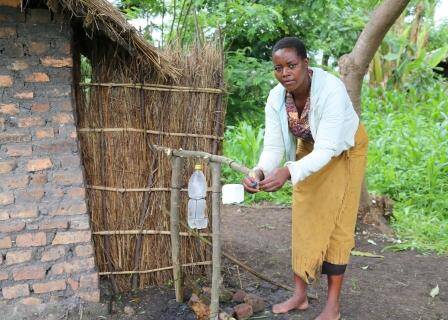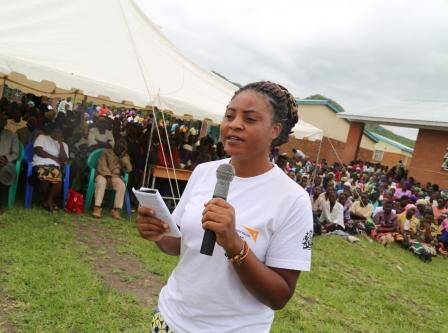
Twelve years ago today, Mitress Januwale was in great pain due to the death of her grandmother Myness Gilimoti to what was a suspected work of witchcraft, according to family members.
Gilimoti died when she was more of a bread winner, hence her anger. Januwale—a mother of a five-year-old boy Timothy Banda—lives in Mtanda, Group Village Head (GVH) Madzumbi, Traditional Authority (T/A) Mazengera in Lilongwe in the Central Region.
“She vomited, felt cold, pugged for two days and later died. This happened before we decided to take her to Nkhoma Mission Hospital of the CCAP Synod for treatment,” Januwale recalls.

Mitress, who was 18 years-old by then, likewise her siblings and parents blamed everyone in the area for the death of their relation.
“She died suddenly and all fingers were pointing at our neighbours. We did not have peace of mind because of the circumstances leading to her death. What I remember is that she had frequent visits to the bush to assist herself as we more often did,” says Mitress.
What is clear here is that Januwale likewise others did not think about a suspected waterborne disease and Malaria to have led to the demise Gilimoti. Other onlookers had similar expressions.
This is enough background that about one billion people or 15 percent of the global population even those in Malawi, practice open defecation, without knowing the consequences.
The problem of open defecation is real and practiced by many Malawians, especially in the rural setups where messages against the practice or poverty is at the centre of it all.
Open defecation solution
Based on such explanations, little did communities in Nkhoma, Chigodi and Chilenje know that what they were doing is open defecation, Malawi wants dealt with to avoid waterborne diseases.
United Nations (UN) and other international organisations such as World Vision have established that extreme poverty and lack of sanitation are statistically linked; and eliminating open defecation is a vital part of development efforts since it is correlated with a high child mortality, under nutrition, poverty and disparities between the rich and poor.
This is why World Vision and the Ministry of Health since 2004 continues to train communities to ensure that good water, sanitary and hygienic measures are followed to deal with the waterborne diseases, including the number killer Malaria.
World Vision is also empowering them with basic skills and needs of owning locally made facilities that will champion water, sanitation and hygiene (WASH) projects within its areas of operations.
With such initiatives, Januwale can now afford to admit that in the previous years, their house had no toilet, enough a sign that they were prone to waterborne related deaths and Malaria.
“Washing hands with soap before eating or after visiting bushes or using protected water was not a priority, but we are now a changed community,” says Januwale, adding that their surroundings usually had uncut grasses— home for the breeding of mosquitoes.
She now explains that they have dug toilets, rubbish pit, clean surroundings and put in place sanitary tools such as soap and water within the vicinity of the toilet for use.
“We wash hands with soap, drink protected water, clean fruits before eating, among others to avoid a replica of what happened to our grandmother and other relations. If we had known we could not have lost her,” she states.
Mother of two, Esnart Kamutu (53) from Malindi in Village Head (VH) Kaphiri in Traditional Authority (T/A) Chitekwere in Malindi also shares the same story. She says, her family was also a staunch believer of the bush and not washing hands with soap.
“We felt pains, suffered from waterborne diseases without ceasing. My children were usual suspects in school in terms of absenteeism because of such diseases,” says Kamutu, adding that: We used unhygienic utensils. This affected our family in terms of farming and other engagements.”
Kamutu states that 1978 was the worst year as she suffered from abdominal pains, her children complained of continuous fever, a development that affected education. Kamutu says, when things got out of hand, they went to a nearby hospital only to be diagnosed of malaria and cholera.
“Since World Vision and Government came in with WASH projects, life has changed for the better as you can see that we have toilets and clean surroundings,” enthuses Kamutu, amid ululation from her colleagues.
For Area Sponsorship Analyst (ASA) for Nkhoma Thokozani Chibwana, World Vision seeks to protect communities from waterborne related deaths by ensuring that water, sanitation and hygiene measures are adhered to at all times.
“At stake is the life of children. Children are the future leaders and we can afford to subject them to poor hygiene and that is why we have different projects. We as World Vision believe in team work with our partners like government in dealing with the vice,” justifies Chibwana.
With such trainings and awareness communities agree that the vice causes public health problems in areas where people defecate in fields, urban parks, rivers and open trenches in close proximity to the living space of others.
How Clean Village competitions sustain hygiene
In a bid to ensure results, WASH project in Nkhoma-Chilenje Area Programs in collaboration with the Ministry of Health and Water sectors have hinted that an idea of Clean Village competition that not only achieves open defecation, but motivates winning villages continue.

Clean village competition involves verification of the villages that have entered into the competition by the village health and water point committees. This is done to establish an element of ownership, leadership and power in the committees that WASH is working with.
Secondly, the data is analyzed by the Health Surveillance assistants and the District Coordinating Team where the team plans to verify the results that have been brought forward on the ground.
After verifying, the two teams meet again to select villages have won and categories. Certification and presentation of gifts are done in honor of the villages that have done well in the competition.
Benchmarks for the competition are the seven basic elements that sanitation and hygiene checks. These include latrine, drop hole cover, hand washing facility, dish luck, kitchen, bathroom and rubbish pits.
Nkhoma-Chilenje AP is measured on 89 percent when it comes to sanitation and hygiene.
In this case, Nkhoma Area Program has a population of 20 000, but specific in the five group village heads (GVHs) there are about 15 000 people. Out of the figure, about 13 730 practice improved sanitation and hygiene which is a positive reaction to the project.
Close to 122 villages in Nkhoma out of 140 are open defecation free, according to the environment authorities and World Vision due to clean village competitions.
“These activities come at a time when the issue of eliminating open defecation remains the main aim of improving access to sanitation globally as a proposed indicator for the Sustainable Development Goals by the United Nations,” says Wash coordinator for the APs Eunice Nafere.
She says even if toilets are available, people still need to be convinced to refrain from open defecation and use toilets. “The country is committed to providing adequate, reliable and sustainable sanitation and hygiene promotion services to attain the vision of ensuring “Sanitation for All in Malawi”, says Nafere.
As it stands now also, Malawi is among the eight African countries which are creatively achieving the goals of community led total sanitation programmes (CLTS). This includes one idea in Malawi where handwashing is monitored based on the health of tree seedlings planted beneath water outlets.















Writting whilest smoking ganja !!!!!! Sindingadabwe ine…
Walemba khaniyi ndi PLSC holder.. Nkhululukileni,,,,, akapeza JCE azalemba zanzeru lol,,,,
Walemba khaniyi ndi PLSC holder.. Nkhululukileni,,,,, akapeza JCE azalemba zanzeru lol,,,,
Za ziiii
everybody knows kuti lilongwe ili ku central region kumene mawaso nd tsiku loti utha kuzalembasotu
everybody knows kuti lilongwe ili ku central region kumene mawaso nd tsiku loti utha kuzalembasotu
Inu mukuti chani kwenikweni sizikuvekaso nkomwe mwalembazi mwato eti
Lero paja date ndi 20 eti?”12yrs ago today” means on the 20th of january 2004..kkkkkk
Chinkhani chitalikilenji koma chopanda mutu
guys headline ndi khani zugwilizana iiiii mwina ineyo ndi umbuli womweu kapena
Zolembana ntchito pa chibale zija mavuto ena amakhalapo ndi amanewa I think ndi wa class 8 ameneyu
Useless!
12 yrs ago today kkkk what that????
Osapuma kaye bwanji ngati mutu wa boilar
Palibe ndamvapo
What z it all about????? 24 r u drunk????? Mukulemba zosamvekatu bwanji osangolemba chilankhulo chanu kuti anthu amvetse
E Ee zovuta
Bwerani kuno ndikupatseni Mnandi Amahewu ngati ili njala. Sizikumvekapo apa.
Mwatopa eti? Bwanji osasiya mulembe mawa. Zamasire basi kkkkk. Twelve years ago today ndiye kuti chiyani?
It means that the day the event happened was on the 20 january 2003
Cant understand
Inu mukuti chani apa sitikumva ife
chingelez timanva koma apa eeeeeee 24 iwe
sizikumvekatu